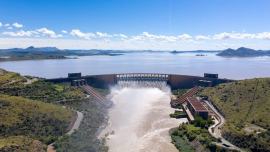
A sustainable sanitation future lies in the country’s ability to adapt to new technologies in an era where water scarcity is taking a firmer hold, says the Department of Water and Sanitation.
“We live in a time where there is not enough water. We are flushing toilets with clean water at a time when climate change has pushed us into a space where we have no assurance about water supply and security for the future,” said Leonardo Manus, the Chief Director of Infrastructure Development at the Department of Water and Sanitation.
Manus on Thursday addressed a webinar hosted by the department, the Government Communication and Information System (GCIS), together with the Department of Science and Innovation and the National Press Club.
The objective of the webinar was to reflect on the challenges at both national and municipal level, and to share insights into the innovation ecosystem.
Over 5 000 mega litres of water, Manus said, is being flushed away daily. This in a country where approximately 23% of households do not have access to services that are above RDP level.
“We sit with a situation where people don’t have services that are acceptable and there are often water supply interruptions.”
The status quo, said Manus, is something the country can ill afford.
“A flushing toilet was created at a time when there was enough water but we are now moving into a time where we do not have enough water, and the price we pay for the convenience of flushing a toilet is an expensive one that our future generations might not afford.”
Manus said that according to statistics, water supply assurance is currently at 65%, which is way below the 98% the country is supposed to have to ensure that people have water supply for all their needs.
Bringing change at municipal level
William Moraka, the Water Services Manager from the South African Local Government Association (SALGA), said in their work with municipalities, they have realised that municipalities are often approached by innovators, claiming they have world class technologies that can solve all their problems.
“It is our observation that municipalities don’t apply their minds when employing or evaluating those innovative solutions.”
He said that SALGA has created a web based one-stop shop with proven technologies that have been vetted by the organisation and other stakeholders in order to ensure that whatever solutions are employed, the technology will work with the unique setting of municipalities, whether rural or urban.
“We’ve also created an online advisory facility for when municipalities experience difficulties in understanding the technology. They can refer to the advisory.”
Moraka said SALGA has partnered with the Department of Science and Innovation, in order to test the viability and validate innovative solutions for service delivery in the water and wastewater domain.
“We are excited that we have received over 120 municipalities that have expressed interest to work with us on the three-year programme. Through this intervention, we should be able to change the situation we are faced with in the sector.”
Moraka said the laboratories of municipalities need to reflect on the five key areas of focus, which are inclusion of all water scientists, infrastructure and capacity building of water science sector, policy and regulation influence, research and development and process technology support.
“We have put together a nation municipal services forum and we are excited that a number of milestones have been reached in attaining these five intentions,” Moraka said.
Valerie Naidoo from the Water Research Commission (WRC) said in order to address the current challenges, South Africa needs to rethink water and sanitation.
“We have to not only be innovative around technology choices, but also be innovative around our approaches and processes.”
Naidoo said the planning paradigm life cycle, the workforce paradigm and partnership paradigm, among others, need to be reworked to suit the current times.
Closing off the webinar, Ashton Mpofu from Young Water Professionals (SA-YWP) said South Africa needs to look at wastewater differently.
“We need to look at wastewater as a resource. We need to think around circular economy. We need to step in as human beings and use our innovation to help nature to fast-track the treatment and reconversion of waste into a product that can be utilised,” Mpofu said. – SAnews.gov.za


